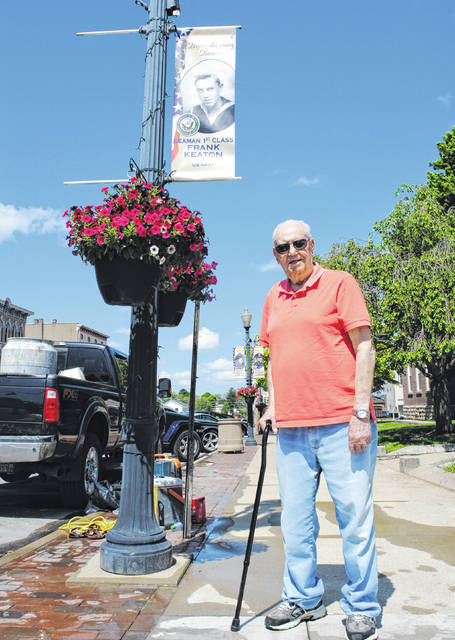
He saw enough during his years with the U.S. Navy in World War II that he doesn’t like to talk much about the grisly details. But Frank Keaton is proud of the poster that was recently placed on West Main Street in Hillsboro in honor of his service to his country.
Now 94, the Rocky Fork Lake area resident said he doesn’t see very good anymore, but his memory is still vivid.
“There were flashes of the wartime stuff probably, but the picture itself I can’t see much,” Keaton said of his first glimpse at the poster this week. “From what I could see, I could imagine myself at that age and I knew it was me. I think it’s a wonderful thing to have done and we were glad to see it up there. I feel real good about it.”
The posters are part of a “Honoring Those Who’ve Served,” project originated by Hillsboro Auditor Alex Butler, with help from many others, a couple years ago. Keaton’s poster was purchased by his daughter, Marilyn Broughton, who lives in Atlanta, Ga. and heard about the project the Veterans Administration.
Originally from the Bainbridge area, Keaton attended school at Rainsboro through the eighth grade, but never went to high school.
“At that time we were poor people and I didn’t have clothes to go to school with, and I just wouldn’t go no more,” Keaton said.
So when he was 17 he decided to enlist in the U.S. Navy. He said it was during his final exam in Columbus when a full lieutenant tried to talk him out of it.
“He looked at me said said, ‘Why don’t you go back home and come back in a year or a year and a half?’” Keaton said. “I said, ‘Oh no, I want to be in the Navy. I want to shoot some of those [Japanese].’ They showed a lot of those war movies back then and they amped you up, I and wanted to go.”
After being shipped to various training schools around the country, Keaton was eventually assigned to an amphibious unit that delivered troops to whatever island U.S. troops were invading.
He talked about dodging snipers for a couple months on Guadalcanal, about him and some buddies buying a new car when they were back in the states and then selling it before they had to go back on a ship, and of having a girlfriend with a brand new Ford when he was stationed in Shoemaker, Calif. and making liberty every night. He said that after about three nights he ran out of money and had to tell the girl. So she handed him a $50 bill and told him to pay because it looked better that way.
Shortly thereafter he shipped out again and said he doesn’t ever remember seeing the girl again. She wrote him a few letters, but he didn’t reply. She wanted to get married. He wasn’t ready.
He likes telling those kind of stories, but not ones about all the death and destruction he witnessed.
“All the stuff that happened, the war part, I’m not going to get into that,”Keaton said. “I don’t want to talk about that. It was enough to be there and go through the islands and see how many of our men they cut down.”
On most islands, he said, the Japanese dug out areas between the reef and shoreline, then lined it with wire and fencing. He said about 15 percent of the men that left his amphibious vessel drowned, partly because of the heavy backpacks they were carrying, and that’s not counting the ones killed by Japanese shooting at them from the beach. He said the islands were heavily bombed before U.S. soldiers invaded them, but the enemy would hide in caves and come out when the U.S. soldiers started to come ashore. At times, he said, the entire first wave of Americans was wiped out, and a second wave had to be sent in just to take the beachheads.
“There were so many guys floating, dead, all blown up and swelled up like you don’t know what,” Keaton said. “The smell … was unbearable, I’ll tell you. But that’s the way most of it was.”
He talked about pulling pranks on officers and faking sleep while soldiers hunted his room for the perpetrators, of boxing matches, of diving into the ocean off the tops of ships, of gruesome initiations for sailors the first time they passed over the equator, and of poker games where money meant nothing because death was always just around the corner.
“In the Navy I had some good times, but keep in mind, during war the bad times far outweigh any good times you ever had,” Keaton said.
He was at Midway, about 250 miles from the coast of Japan, when a peace treaty was finally signed.
“We didn’t want no peace,” Keaton said, as he talked about local resident Jesse Eubanks having to endure the Bataan Death March, and the ruthlessness of Japanese soldiers throughout the war. “We wanted to go in and just completely destroy Japan so there was nothing left.”
After three years, six months and 21 days, Keaton was finally relieved of his duties. He said he ran around Greenfield for about a year and a half, then worked at Delco Products in Dayton for 33-plus years. He moved to the Rocky Fork Lake area in 1979.
“At this point in time I can’t say I regret going into the service and serving my country,” Keaton said. “But I will tell you there’s an awful lot of our people — an awful lot — buried over there.”
Reach Jeff Gilliland at 937-402-2522.


